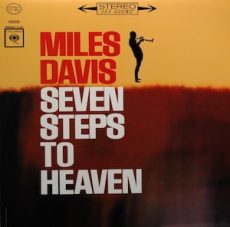
Requisites
Seven Steps To Heaven ~ Miles Davis | By Eddie Carter
This morning’s album from the library is a hidden gem in Miles Davis’s extensive discography. In 1962, his quintet was undergoing a significant transition. Hank Mobley departed to pursue a solo career, and the musical trio of Kelly, Chambers, and Cobb would soon become one of the most celebrated in jazz. Seven Steps To Heaven (Columbia CL 2051/CS 8851) is a product of two sessions by the trumpeter at Columbia’s New York and Los Angeles studios. His supporting cast includes George Coleman (tracks: A2, B1, B3) on tenor sax, Victor Feldman (A1, A3, B2), Herbie Hancock (A2, B1, B3) on piano, Ron Carter on bass, Frank Butler (A1, A3, B2), and Anthony Williams (A2, B1, B3) on drums. My copy is the original 1963 U.S. Stereo release.
Side One starts with Basin Street Blues by Spencer Williams. The first of three quartet performances opens with the foursome expressing the song’s softer emotions in the melody, featuring Miles using a mute. He sustains the gentle mood in the first solo before picking up the pace for a delightful conclusion. Victor gets into something good in a delightful reading ahead of the quartet, easing back into the theme. Seven Steps To Heaven by Miles Davis and Victor Feldman is off to the races from the rhythm section’s introduction to the quintet’s quick melody. Miles kicks off the solos, wailing, and then George swings vigorously into the second statement. Herbie takes an exhilarating turn next, preceding the reprise and close.
I Fall In Love Too Easily by Jule Styne and Sammy Cahn first appeared in the 1945 musical comedy Anchors Aweigh. Miles is back on the muted trumpet for the quartet’s tenderness and warmth during the melody. The leader’s opening statement is reflective yet quite beautiful. Victor expresses great care and thoughtfulness in the second solo until Miles returns to deliver a gorgeous climax. So Near, So Far by Tony Crombie and Benny Green kicks off the second side with the quintet’s medium theme. Miles gets things started on the open horn. George picks up the baton and really shines in the following presentation. Herbie has the final word and delivers a terrific performance into the ensemble regrouping for the closing chorus.
Baby, Won’t You Please Come Home by Charles Warfield and Clarence Williams is a blues song from 1919 that brings Miles back on the muted trumpet. Victor opens with a solo introduction ahead of the quartet’s touching melody. The trumpeter opens with a delicately tender interpretation; then Victor brings the solos to a close into the foursome’s thoughtfully graceful ending. Victor Feldman’s Joshua turns the temperature up one final time. Miles’s fingers snap the quintet to attention for the song’s lively theme. Miles steps up first in the spotlight with an enthusiastic performance. George takes over to deliver long, flowing lines that are equally satisfying. Herbie wraps things up with a festive finale that hits a perfect groove into the quintet’s reprise and completion.
Teo Macero produced Seven Steps To Heaven, although it’s unknown who recorded both sessions. It doesn’t matter, however, because this is a terrific recording with a crisp, detailed soundstage that sparkles. It is the first time George, Herbie, Ron, and Tony have recorded with Miles. George wouldn’t make another studio album with Miles, but appears on three live albums with this group, ‘Four’ & More, Miles Davis In Europe and My Funny Valentine. Hancock, Carter, and Williams formed the nucleus of Miles’s second great quintet and would remain with him for the next five years.
Victor turned down Miles’s invitation to join his quintet because he was a successful West Coast session musician, so he and Frank remained in California. If you’re in the mood for an excellent album of ballads and uptempo tunes and are a fan of Miles Davis from the early sixties, I highly recommend checking out Seven Steps To Heaven. It’s a stellar album that not only gives a glimpse into what was to come from The Second Great Miles Davis Quintet but also stands on its own as a title worthy of any jazz lover’s library. You’ll find it a rewarding addition to your collection, and I’m confident it will bring you hours of musical enjoyment.
~ ‘Four’ & More (Columbia CL 2453/CS 9253), Miles Davis In Europe (Columbia CL 2183/CS 8983), My Funny Valentine (Columbia CL 2306/CS 9106) – Source: Discogs.com ~ Baby, Won’t You Please Come Home, Basin Street Blues, I Fall In Love Too Easily – Source: JazzStandards.com © 2024 by Edward Thomas CarterMore Posts: choice,classic,collectible,collector,history,instrumental,jazz,music,trumpet


